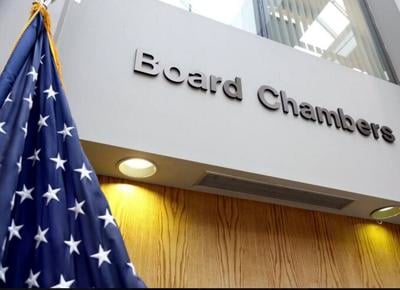More grants and aid to local businesses and funds to help county residents struggling with the effects of the COVID-19 pandemic are among the top recommended uses for Prince William County’s latest round of federal stimulus money.
During a work session Tuesday, the Board of County Supervisors discussed how to spend its allocation from the American Rescue Plan. The county is receiving $91.4 million in two installments from the relief package. The first $45.7 million payment was allocated May 19. The county has at least two years to spend the money.
County Executive Chris Martino said staff originally believed the county could use a large portion of the funding for economic recovery, but is shifting some funds back into response efforts as case numbers are reaching levels similar to earlier in the pandemic.
County staff recommended distributing $16 million for economic recovery initiatives, $10 million for community organizations and $5 million for an emergency response program. Also recommended are $4.5 million for a crisis stabilization unit, $4 million for premium pay for hazardous duty workers, $3.7 million for grant administration and $2.5 million for a community feeding program.
Finance Director Michelle Attreed said the county can shift funds to different programs as needed. “We’re able to move those dollars around. It’s not all going to be spent on day one.”
The board appeared to support the majority of the allocations, but requested more information about the crisis stabilization unit and premium pay for workers.
Economic recovery
The economic recovery initiatives cover a slew of proposed programs aimed at covering operating costs, supporting startups and job training.
The majority of the money, $10 million, would be for grants to hospitality and tourism-related businesses. The grants would support businesses in need of rent relief, working capital and operating costs.
About $1.9 million would be spent over two years to create a Small Business Resource Center and a revolving loan fund for small businesses.
The resource center would assist businesses with a variety of needs. The program would also provide $750,000 in loans to businesses “unable to secure adequate funding from traditional lending sources,” said Christina Winn, executive director of the county’s Department of Economic Development.
Supervisors Jeanine Lawson, R-Brentsville, and Yesli Vega, R-Coles, were concerned about criteria for the loans.
“If we don’t have some standards, I will accuse this board of throwing money around,” Lawson said. “We do have a fiduciary responsibility to make sure we’re not throwing around money.”
Supervisor Margaret Franklin, D-Woodbridge, said some of the applicants might not have an existing business and are seeking startup help. “There are a lot of reasons why people might have bad credit,” she added.
Winn said the county is still working on the program’s structure and would provide updates and collaborate with the board about loan criteria.
County staff also recommended $1.5 million over two years to provide job training and certifications in partnership with Virginia Career Works Northern VA. The program would provide a free GED to unemployed county residents and connect people with job opportunities.
About $1.05 million would support development and costs for businesses in hub zones, which are federally designated areas with higher poverty rates.
The county would use $500,000 for grants to startup tech transfer companies and another $500,000 to support life science companies. A startup counselor to provide technical assistance to biotech startups would be provided at $85,000 a year over three years.
The county would use $100,000 to hire a consultant to determine whether any barriers exist for growth at minority- or woman-owned businesses. The county would use $200,000 for marketing of the grant programs and $3.7 million for administration costs.
Emergency response
Another $10 million would go toward community organizations assisting people struggling with the pandemic. The nonprofits would be focused on utility and rent, child care, legal services and mental health services.
Through previous federal stimulus funding, the county provided $3 million to 27 nonprofits, supporting nearly 9,000 people.
Supervisors requested more information on about $4.5 million planned to support facility acquisition and startup costs for a crisis stabilization unit. In July, the board signed off on the creation of the 24-hour crisis receiving center for stabilization services.
The state defines crisis stabilization services as direct interventions to avert emergency psychiatric hospitalization or institutional placement for people suffering mental health crises.
County staff previously presented a proposal for 26,300 square feet to house a crisis stabilization unit with 16 adult and eight youth beds, plus 16 adult and eight youth observation recliners. The unit would accept drop-offs and people under temporary detention orders to connect them with treatment and services.
The program is estimated to require $6.4 million in startup costs. Annual ongoing expenses were estimated at $17.3 million. The expenses would be partly offset by $8.4 million to $10.3 million in revenue and $7 million to $8.9 million from other state and local funding sources.
The county’s Emergency Operations Center would receive $5 million for overtime, personal protective equipment and support for COVID-19 vaccine distribution.
The feeding program, which has been ongoing throughout the pandemic, would receive $2.5 million to support food purchases, warehouse operations and grants to community partners. The money would be spread over three fiscal years.
Premium pay
Essential workers would be eligible for one-time payments of $500 or $1,000. These workers are defined as anyone who regularly performs in-person duties, interacts with others at work, or physically handles items handled by others.
Full-time employees would be eligible for $1,000, and part-time employees could receive $500. The county previously approved a $500 bonus for all employees in December. The federal legislation limits eligibility to workers who make less than $114,815.
Lawson advocated for the Sheriff’s Office to receive funding for its deputies. County staff plan to provide more information about that allocation at a future meeting.
The county is seeking community input about spending the funding through its website. Staff will provide the board with quarterly updates on the programs.



(1) comment
Funny money
Welcome to the discussion.
Log In
Keep it Clean. Please avoid obscene, vulgar, lewd, racist or sexually-oriented language.
PLEASE TURN OFF YOUR CAPS LOCK.
Don't Threaten. Threats of harming another person will not be tolerated.
Be Truthful. Don't knowingly lie about anyone or anything.
Be Nice. No racism, sexism or any sort of -ism that is degrading to another person.
Be Proactive. Use the 'Report' link on each comment to let us know of abusive posts.
Share with Us. We'd love to hear eyewitness accounts, the history behind an article.